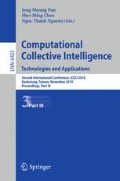Abstract
To facilitate communication and the exchange of information between patients, nurses, lab technicians, health insurers, physicians, policy makers, and existing knowledge-based systems, a set of shared standard terminologies and controlled vocabularies are necessary. In modern health information management systems, these vocabularies are defined within formal representations called ontologies, where terminologies are only meaningful once linked to a descriptive dataset. When the datasets and their conveyed knowledge are changed, the ontological structure is altered accordingly. Despite the importance of this topic, the problem of managing evolving ontological structures is inadequately addressed by available tools and algorithms, partly because handling ontological change is not a purely computational affair. In this paper, we propose a framework inspired by a social activity, birdwatching. Using this model, the evolving ontological structures can be monitored and analyzed based on their state at a given time. Moreover, patterns of changes can be derived and used to predict and approximate a system’s behavior based on potential future changes.
Access this chapter
Tax calculation will be finalised at checkout
Purchases are for personal use only
Preview
Unable to display preview. Download preview PDF.
References
Verhagen, F.C.: Worldviews and Metaphors in the human-nature relationships: An Ecolinguistic Exploration Through the Ages. Language & Ecology 2(3) (2008)
eHealth: standardized terminology. Executive Board 118th Session, EB118, Provisional agenda 8.4. World Health Organization (May 25, 2006), http://apps.who.int/gb/ebwha/pdf_files/EB118/B118_8-en.pdf
Hedden, H.: Controlled Vocabularies, Thesauri, and Taxonomies. The Indexer 26(1), 33–34 (2008)
Gruber, T.R.: A translation approach to portable ontologies. Knowledge Acquisition 5(2), 199–220 (1993)
Shaban-Nejad, A., Haarslev, V.: Bio-medical Ontologies Maintenance and Change Management. In: Sidhu, A.S., Dillon, T.S. (eds.) Biomedical Data and Applications. Studies in Computational Intelligence, vol. 224, pp. 143–168. Springer, Heidelberg (2009)
Smith, M.J., Dewar, R.G., Kowalczykiewicz, K., Weiss, D.: Towards Automated Change Propagation; the value of traceability. Technical Report, Heriot Watt University (2003)
Shaban-Nejad, A., Haarslev, V.: Incremental biomedical ontology change management through learning agents. In: Nguyen, N.T., Jo, G.-S., Howlett, R.J., Jain, L.C. (eds.) KES-AMSTA 2008. LNCS (LNAI), vol. 4953, pp. 526–535. Springer, Heidelberg (2008)
Shaban-Nejad, A., Haarslev, V.: Human Factors in Dynamic E-Health Systems and Digital Libraries. In: Pease, W., Cooper, M., Gururajan, R. (eds.) Biomedical Knowledge Manage-ment: Infrastructures and Processes for E-Health Systems. Information Science Reference – ISR, pp. 192–203. IGI Global (2010)
Asperti, A., Longo, G.: Categories, types, and structures: an introduction to category theory for the working computer scientist. MIT Press, Cambridge (1991)
Ehrig, H., Ehrig, K., Prange, U., Taentzer, G.: Fundamentals of Algebraic Graph Transformation. In: Monographs in Theoretical Computer Science. An EATCS Series. Springer, New York (2006)
Scribner, P.: Introduction to Ontological Philosophy (1999), http://www.twow.net/MclOtaI.htm
Holsti, K.J.: The Problem of Change in International Relations Theory. Paper No. 26 from CIR Working Paper Series (1998)
Gilbert, M.C.: The Dialectics of Knowledge Management (2006), http://news.gilbert.org/DialecticsKM
Osborne, M.J.: Nash Equilibrium: Theory. In: An Introduction to Game Theory. Oxford University Press, USA (2003)
Holt, C.A., Roth, A.E.: The Nash equilibrium: A perspective. PNAS 101(12), 3999–4002 (2004)
Mitchell, T.M.: The need for biases in learning generalizations. In: Shavlik, J.W., Dietterich, T.G. (eds.) Readings in Machine Learning, pp. 184–191. Morgan Kaufmann, San Francisco (1990)
Chung, S., McLeod, D.: Dynamic Pattern Mining: An Incremental Data Clustering Approach. J. Data Semantics 2, 85–112 (2005)
Wong, W.K., Moore, A.W., Cooper, C.F., Wagner, M.: Bayesian Network Anomaly Pattern Detection for Disease Outbreaks. In: 20th International Conference on Machine Learning (ICML 2003), pp. 808–815. AAAI Press, Menlo Park (2003)
Mays, E.: A Modal Temporal Logic for Reasoning about Change. In: 21st Annual Meeting of the Association for Computational Linguistics (ACL), Cambridge, MA, US, pp. 38–43 (1983)
Heylighen, F.: Representation and Change. A Metarepresentational Framework for the Foundations of Physical and Cognitive Science. Communication & Cognition, Gent. 200 (1990)
Shaban-Nejad, A., Ormandjieva, O., Kassab, M., Haarslev, V.: Managing Requirements Volatility in an Ontology-Driven Clinical LIMS Using Category Theory. International Journal of Telemedicine and Applications, Article ID 917826, 14 (2009) doi: 10.1155/2009/917826
Shaban-Nejad, A., Haarslev, V.: Ontology-inferred phylogeny reconstruction for analyzing the evolutionary relationships between species: Ontological inference versus cladistics. In: 8th IEEE International Conference on Bioinformatics and Bioengineering (BIBE 2008), Athens, Greece, pp. 1–7. IEEE Press, Los Alamitos (2008)
Wang, J.: Computational Approaches to Linguistic consensus. Dissertation at University of Illinois at Urbana-Champaign (2006)
Galileo, G.: Dialogue Concerning the Two Chief Systems of the World - Ptolemaic and Copernican (1632), http://www.gap-system.org/~history/Extras/Galileo_Dialogue.html
Lawvere, F.W., Schanuel, S.H.: Conceptual Mathematics: A First Introduction to Categories, 2nd edn. Cambridge University Press, Cambridge (2009) (The 1st ed. published on 1997)
Author information
Authors and Affiliations
Editor information
Editors and Affiliations
Rights and permissions
Copyright information
© 2010 Springer-Verlag Berlin Heidelberg
About this paper
Cite this paper
Shaban-Nejad, A., Haarslev, V. (2010). Strategic Health Information Management and Forecast: The Birdwatching Approach. In: Pan, JS., Chen, SM., Nguyen, N.T. (eds) Computational Collective Intelligence. Technologies and Applications. ICCCI 2010. Lecture Notes in Computer Science(), vol 6423. Springer, Berlin, Heidelberg. https://doi.org/10.1007/978-3-642-16696-9_49
Download citation
DOI: https://doi.org/10.1007/978-3-642-16696-9_49
Publisher Name: Springer, Berlin, Heidelberg
Print ISBN: 978-3-642-16695-2
Online ISBN: 978-3-642-16696-9
eBook Packages: Computer ScienceComputer Science (R0)

